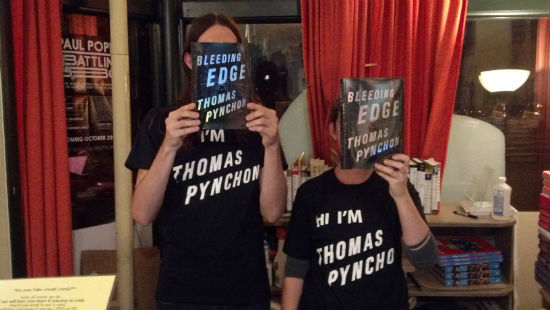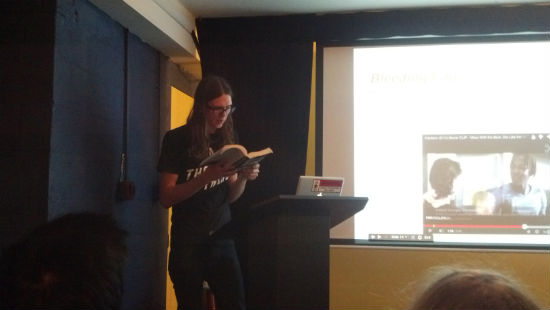
I started reading Thomas Pynchon at an age long before I was prepared for the density of his prose, his images, and the connections he makes between disparate aspects of life. Does it matter? No — I was hooked. I was, in my early teens, a pretty dedicated reader of Isaac Asimov’s Science Fiction Magazine. (Fun fact: also the first place I encountered the fiction of one Jonathan Lethem.) In one of his regular columns on books — this one titled, I believe, “North American Magic Realism” — Norman Spinrad gave Pynchon’s Vineland a detailed and considered review. At that age, I got the sense that, hey, maybe this Pynchon guy was someone I should read — which is how I ended up reading Vineland and Gravity’s Rainbow at a pretty young age. And while I didn’t quite “get” either one the first time around, it meant that I had Gravity’s Rainbow on my shelf in late 2001, when I felt a lot more ready to delve into his body of work.
All of that is a kind of prelude to explain why I ended up at WORD late on a Monday night, waiting to pick up a pre-ordered copy of Bleeding Edge, Pynchon’s latest.

I also read a couple of passages from Against the Day, Pynchon’s 2006 novel of radical politics, aerial adventurers, and cosmic evil. My original plan had been to tell a series of Pynchon-themed knock-knock jokes, but this was the best I could come up with:
Knock, knock.
Who’s there?
Thomas Pynchon.
Evidently you haven’t gotten the hang of this “recluse” thing, Thomas.

Hence the Against the Day-reading. With the exception of Brad Nelson, who opened the reading segment (itself preceded by a heated game of Pynchon trivia) with a passage from Gravity’s Rainbow, most of the readings came from Pynchon’s more recent work. Two from Mason & Dixon, one from Against the Day, and one short segment from Bleeding Edge. Two of the excerpts read involved songs; neither of the readers (one of whom was me) opted to actually sing said lyrics.
The fact that Bleeding Edge is set in the New York City of 2001 — and apparently features mention of both Razorfish and emo — has me even more eager to read it. One of Pynchon’s great skills has always been the way he shifts familiar landscapes into something disorienting; having lived in New York during the year in which Bleeding Edge is set, I’m particularly curious to see what he has in store. I suppose I’ll know soon; I’m planning to start reading the book in a few hours.

Follow Vol. 1 Brooklyn on Twitter, Facebook, Google +, our Tumblr, and sign up for our mailing list.
